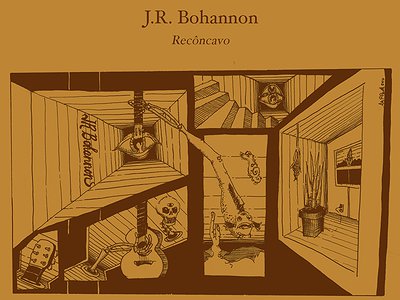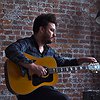Could you take us through a day in your life, from a possible morning routine through to your work? Do you have a fixed schedule? How do music and other aspects of your life feed back into each other - do you separate them or instead try to make them blend seamlessly?
My life is up and down. I don’t make a living playing music sadly, so I bartend on weekends. So, I really take Monday-Thursday to dig into my work, and also, to give myself time to grow and heal as a human. I think mental health comes first and foremost, so I give myself time at the beginning of my day to make sure I’m right with myself, before I get into the work. I don’t believe in the self-destructive nature of art that society has glorified. But I also allow myself to come and go from it. I don’t have a fixed schedule, because I don’t operate well from a fixed schedule. But I’d say on any given day I end up doing anywhere from 5-10 hours of work anyway because it’s just within the natural flow of things. I get joy out of so many different rituals that I don’t fight them anymore: they all interact with each other and create my artistic identity.
Could you describe your creative process on the basis of a piece or album that's particularly dear to you, please? Where did the ideas come from, how were they transformed in your mind, what did you start with and how do you refine these beginnings into the finished work of art?
There’s an album come out this fall called Dusk that really encompasses a lot of these questions about growth as an artist, finding your sound, etc. That album has everything to do with me discovering my own voice, on the guitar in particular. I recorded this album three times, and the first two times, I scrapped it. The playing didn’t feel right. It was too calculated, or too fast, or too slow. The speed of my compositions won’t be determined by a metronome - it’s guided by the intricacies of human life and the way I respond to them. I really let myself create from inside on this album, and really made sure that it comes off that way in the finished product. I’m proud of it.
There are many descriptions of the ideal state of mind for being creative. What is it like for you? What supports this ideal state of mind and what are distractions? Are there strategies to enter into this state more easily?
I’ve never been granted the ideal state of mind for being creative. Mental health struggles have played a large part in my life, so music has always been a way to ease those. So, I’ve never really seen an ideal state of mind as a place I needed to go to create music, it’s more of a response from a non-ideal state of mind.
How is playing live and writing music in the studio connected? What do you achieve and draw from each experience personally? How do you see the relationship between improvisation and composition in this regard?
Playing live and playing in the studio are frankly two different brains for me. I’m more of a studio guy. I love sitting there doing take after take and just experimenting with sound. That will always be my love and fascination first and foremost, but the past handful of years I’ve started to really enjoy playing live as I’ve been doing the sideman thing and playing in bands more. I’d say that playing live is more about getting a high on connection with other humans (or missing the mark completely is its own vibe), and in the studio I’m generally jamming with myself, so obviously the interaction is going to be a bit different. My performances are 100% a product of my environment though. I change things up on the fly depending on space, audience, etc. I think it’s really important to connect with the space and environment before you try and connect with an audience.
How do you see the relationship between the 'sound' aspects of music and the 'composition' aspects? How do you work with sound and timbre to meet certain production ideas and in which way can certain sounds already take on compositional qualities?
Sound is composition for me. I record “sounds” almost every day, and I always incorporate them somehow into my compositions. I think about timbres of amps, guitars, rooms, EQs, etc. and I how can intersect them with sound in the environment all the time, and it doesn’t matter what kind. If I recorded this upcoming record in a reverb chamber, I would’ve played a fifth of the notes I played and probably reconstructed everything to be a hell of a lot slower. But I wrote most of this record in dead rooms and challenging constructs, so it reflects that for sure.
Our sense of hearing shares intriguing connections to other senses. From your experience, what are some of the most inspiring overlaps between different senses - and what do they tell us about the way our senses work? What happens to sound at its outermost borders?
Music for me is a meditation. A meditation on all of the senses, yet I don’t think too much about what’s happening while I’m playing. If I tuned too much into the reality around me, it would take away from the experience. I know my senses are heightened while I’m playing, I’ll tell you that much. My sense of awareness of generally everything I’m feeling at that moment becomes more in sync. If my arm’s in pain, I’m going to play differently to accompany. If my eyes are open for too long, I’m out of touch with my hearing generally. There are so many different connections, and yet, they somehow all seem to come together when the time is right.
Art can be a purpose in its own right, but it can also directly feed back into everyday life, take on a social and political role and lead to more engagement. Can you describe your approach to art and being an artist?
My approach to art and being in artist has a lot to do with the traditions that started in the south where I grew up. People looked at their instrument and their craft as a trade. They took it seriously, and put in the hours, and got the results. As far as social and political go in my own music making, a lot of the things I write are dealing with inner struggles and my own interpretations of those struggles. Obviously, the times we’re living in affect the way we think and operate, or at least they damn well should. It probably influences the music in some way, but again, it’s all some kind of escape for me, and I think my role has been to provide that escape whenever given the opportunity.
It is remarkable, in a way, that we have arrived in the 21st century with the basic concept of music still intact. Do you have a vision of music, an idea of what music could be beyond its current form?
I have no vision of a future outside of what’s happening right now. We’re living in an incredible time for music makers and lovers of sound - the outlets for exploration are infinite as is, and even instruments like the guitar have plenty of room left for innovation. I just like to put my voice into whatever the medium.



